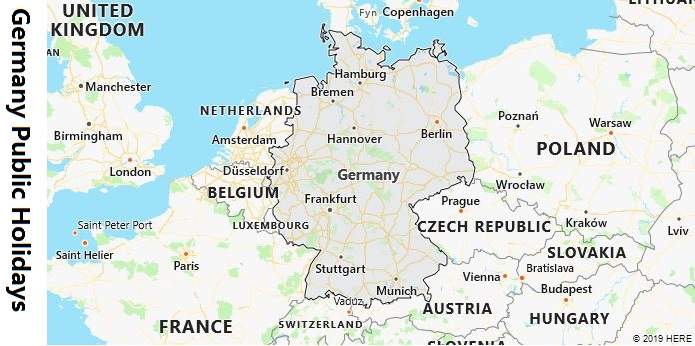Germany Holidays
Germany Public Holidays
Searching for the national holidays in Germany? All public holidays in Germany are treated like Sundays. This means that most of the Germany employees have a day off and all schools are closed on these office holidays. If you are planning a trip to Germany and want to know what the national and regional holidays are, check the details in the tables below.
List of Official Holidays in Germany for Year 2020
| # | Date | Holiday Name | Day |
|---|---|---|---|
| 1 | New Year’s Day | Wednesday | |
| 2 | Three King’s Day | Monday | |
| 3 | Fasching | Monday | |
| 4 | International Women’s Day | Sunday | |
| 5 | Good Friday | Friday | |
| 6 | Easter Monday | Monday | |
| 7 | Labour Day | Friday | |
| 8 | Victory in Europe Day | Friday | |
| 9 | Mother’s Day | Sunday | |
| 10 | Ascension Day | Thursday | |
| 11 | Father’s Day | Thursday | |
| 12 | Whit Monday | Monday | |
| 13 | Corpus Christi | Thursday | |
| 14 | Assumption Day | Saturday | |
| 15 | Oktoberfest | Saturday | |
| 16 | World Children’s Day | Sunday | |
| 17 | German Unity Day | Saturday | |
| 18 | Reformation Day | Saturday | |
| 19 | All Saints’ Day | Sunday | |
| 20 | Repentance Day | Wednesday | |
| 21 | Christmas Day | Friday | |
| 22 | St. Stephen’s Day | Saturday |
List of Official Holidays in Germany for Year 2021
| # | Date | Holiday Name | Day |
|---|---|---|---|
| 1 | New Year’s Day | Friday | |
| 2 | Three King’s Day | Wednesday | |
| 3 | Fasching | Thursday | |
| 4 | International Women’s Day | Monday | |
| 5 | Good Friday | Friday | |
| 6 | Easter Monday | Monday | |
| 7 | Labour Day | Saturday | |
| 8 | Mother’s Day | Sunday | |
| 9 | Ascension Day | Thursday | |
| 10 | Father’s Day | Thursday | |
| 11 | Whit Monday | Monday | |
| 12 | Corpus Christi | Thursday | |
| 13 | Assumption Day | Sunday | |
| 14 | Oktoberfest | Saturday | |
| 15 | World Children’s Day | Monday | |
| 16 | German Unity Day | Sunday | |
| 17 | Reformation Day | Sunday | |
| 18 | All Saints’ Day | Monday | |
| 19 | Repentance Day | Wednesday | |
| 20 | Christmas Day | Saturday | |
| 21 | St. Stephen’s Day | Sunday |















































